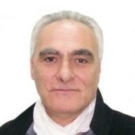Speaker

James M. Dorsey
Senior Fellow
S. Rajaratnam School of International Studies - Singapore
Moderator
Event Summary
On June 19, 2020, Arab Center Washington DC (ACW) hosted James M. Dorsey for a virtual discussion titled “Political and Economic Competition in the Eastern Mediterranean.” Dorsey is a scholar and award-winning journalist who covers the Middle East, North Africa, and Southeast Asia. ACW Executive Director Khalil E. Jahshan introduced the speaker and moderated the discussion.
Khalil Jahshan opened the discussion by highlighting the fact that the Eastern Mediterranean has entered a new phase of conflict over the last decade with additional discoveries of oil and gas. At the same time, old and traditional actors external to the region, like the United States and Russia, have become more deeply involved while local players and participants have worked to form alliances based on common interests and economic and political considerations. Jahshan concluded that these developments promise to keep the Eastern Mediterranean as an area of competition for the foreseeable future.
James Dorsey began his comments by highlighting important elements in the rivalry pitting the big powers—the United States, Russia, and China—against each other for influence. He spoke of American worries about China’s role in the Eastern Mediterranean, reminding the audience of US Secretary of State Mike Pompeo’s visit to Israel last March during which he requested a slowdown of the burgeoning relationship with China. Dorsey also focused on Russia’s role in both Syria and Libya, citing Europe’s concerns about Moscow’s base in Syria and a possible one in the southern Mediterranean in Libya. Looking at regional players, he examined the close relationship being built and strengthened between Israel, Greece, and Cyprus, opposite Turkey and Qatar, two countries that have become close allies and partners in the last few years. The United Arab Emirates, Dorsey stated, “clearly wants to be a player in the region”; further, the UAE is a foe of Islamist forces and is afraid they will take over Libya.
Dorsey explained that the Chinese role in the Eastern Mediterranean is becoming a serious one. China has agreements with many countries to manage their seaports, such as with Turkey, Israel, and Egypt. As perhaps the most capable country to help Syria in its reconstruction, China wishes to have footholds in the ports of Tartous and Latakia. Its success in these endeavors would pose a serious problem for the US Navy in the region. Dorsey stated that “the Americans so far have let that go unchallenged, but you’re starting to see that the Americans are being uncomfortable about that.” As for the challenge of China and Russia to American supremacy in the Gulf, he said that they cannot replace the United States there and, in fact, they rely on the US role in global security not only in the Gulf but also around the world.
In answering a question on American leadership (or absence thereof), Dorsey said that he does not see much of an articulated US policy. He said that many observers feel that the United States has become unreliable under Trump because of his emphasis on the “America First” principle. Dorsey described global actors and decision makers as appearing to be in a holding pattern. If Biden wins the presidency in the coming election, Dorsey said that he did not see the status quo ante as fully returning because circumstances around the world and in the United States are different now. He also spoke of a redefinition of the American role in the Middle East, stating that “what the Americans really have done is … open the door to a process that will evolve over time in which regional security will be multilateral. They actually opened that process simply through the perception of being unreliable.” As for the COVID pandemic, Dorsey noted that it has decreased cooperation between countries of the region while, in fact, exacerbating conflicts even further.
Speaker Bio
James M. Dorsey is a scholar and award-winning journalist. He serves as senior fellow at Singapore’s S. Rajaratnam School of International Studies and co-director of the University of Wuerzburg’s Institute of Fan Culture. Dorsey is one of the pioneers in the field of exploring the political, social, and economic aspects of Middle Eastern and North African soccer. He has published widely in scholarly journals, writes a syndicated column, and is the author of the acclaimed blog, “The Turbulent World of Middle East Soccer,” and a recently published book with the same title. Dorsey focuses on political and social change in the Middle East and North Africa and its impact on Southeast and Central Asia, ethnic and religious conflict, and the nexus of sports, politics, and society in the Middle East, North Africa, and Asia.

